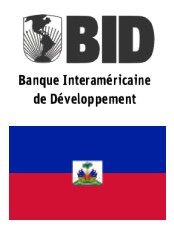|
||||||||||||||||||
|
|
Haiti - Reconstruction : The IDB with Haiti to avoid stagnation 27/03/2011 09:22:14
The report notes that Haiti will require "a quantum leap" to overcome its poverty and stagnation. After growing more slowly than the rest of the countries in Latin America and the Caribbean for most of the past decade, Haiti was battered by major hurricanes in 2008 and the fulminating 2010 earthquake, which killed around 250,000 people and left its capital, Port-au-Prince, in ruins. "Without a major change in growth trends, Haiti would be left behind while the rest of the region becomes more prosperous" the report adds. "The Bank is committing substantial resources to help in building back a better Haiti and avoid further stagnation" In its report the IDB described the challenge posed by the earthquake, which exacerbated the country's already dire conditions, causing more than $8 billion in damages and losses, the equivalent of 120 percent of its gross domestic product. After summarizing the international response to Haiti's plight, the report looks in more depth into the IDB's immediate response and long-term commitments to help the country recover from one of the worst natural disasters recorded in history. In March 2010 the IDB's Board of Governors agreed to cancel Haiti's pending debt ($484 million) and convert undisbursed loan balances ($144 million) into grants. In addition, the Governors decided to finance the Haiti Grant Facility with a $200 million transfer to be approved annually, through 2020, providing the Bank an opportunity to plan for long-term actions in support of Haiti's recovery. The IDB is focusing on six priority areas of Haiti's Action Plan for National Recovery and Development: education, water and sanitation, transportation, energy, agriculture and private sector development. The Bank plans to invest hundreds of millions of dollars in each of these sectors over the next five years, with special attention to strengthening the institutional capacity of Haitian public sector agencies. For instance, the IDB is supporting a reform to expand access to free, quality education in Haiti. The Bank has pledged to provide $250 million in grants and to raise an additional $250 million in co-financing for this ambitious plan. Besides providing resources for building earthquake and hurricane resistant public schools, the IDB will assist the Education Ministry in gaining the expertise to oversee the resulting publicly financed school system. Haiti also has an urgent need to generate more jobs, especially in regions outside Port-au-Prince, which has traditionally concentrated economic activity and investments. The IDB is supporting the development of a new industrial park in the Northern Region, a project that could result in more than 50,000 jobs. A novel fund, backed by $50 million provided by Spain, will help expand access to credit for Haitian small and medium-sized companies. Tthe IDB is focused on Haiti's long-term recovery, it has also provided emergency assistance to address urgent needs arising both from the earthquake and the cholera outbreak. In December the Bank made a $15 million grant to help the Haitian Public Health Ministry expand a network of oral rehydration posts and cholera treatment centers. Over the past year the IDB approved an unprecedented $251 million in new grants for Haiti and disbursed a record $177 million, despite a hiatus forced by the emergency following the earthquake. More concretely, the IDB’s support for Haiti translated into, among other outcomes:
|
|
|
Why HaitiLibre ? |
Contact us |
Français
Copyright © 2010 - 2024 Haitilibre.com |



